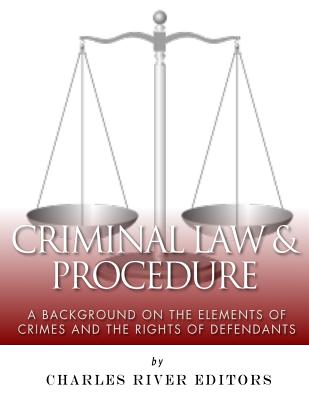Criminal Law & Procedure: A Background on the Elements of Crimes and the Rights of Defendants

Criminal Law & Procedure: A Background on the Elements of Crimes and the Rights of Defendants
*Includes a table of contents The United States has one of the most technically sound criminal justice systems in the world. Mostly derived from English common law, the U.S. Constitution explicitly lays out when and how a citizen can be searched and arrested, as well as their other rights to trial. But, as with many of the Constitution's powers, the experiences of the colonists at the hands of the British shaped our legal system's criminal procedure laws. Like most of American jurisprudence, American criminal law is rooted in the early American settler's experience with British law. In fact, when Thomas Jefferson drafted the Declaration of Independence and listed the "repeated injuries and usurpations" of the British monarchy, he named no less than five alleged offenses implicating the criminal justice system. Jefferson noted the King had "refus[ed] his assent to laws for establishing judiciary powers," and he had "made judges dependent on his will alone." Jefferson also accused the British of conducting "mock trials" to protect their own soldiers who had committed crimes against the colonists, while depriving colonists of the rights to a trial by jury of their own peers. Criminal procedure is a subset of constitutional law that focuses on the procedures by which authorities investigate, prosecute, and adjudicate crimes. Criminal procedure rules frame the behavior of police, prosecutors, and judges when they seek to apprehend, charge, and convict those suspected of committing a crime to ensure that the suspect's constitutional rights are protected. After the colonists won the American Revolution, the Framers set about creating a Constitution that addressed all of these issues. Most of them are addressed in the 4th-8th Amendments of the Constitution. The 4th Amendment prohibits practices such as the writs of assistance by requiring probable cause for warrants, while the 6th and 7th Amendments protect against mock trials by requiring impartial juries and other trial rights. The Constitution also grants defendants the right of habeas corpus, which allows anyone charged with a crime to demand that the evidence against him be produced. However, time and circumstances change. In the 18th century, the Framers rode carriages to Philadelphia, not cars. Authorities had less reason to worry about dangerous weapons that could be hidden in coat pockets. As a result, American courts have had to apply the Constitution to new technology and circumstances beyond what t
PRP: 63.09 Lei
Acesta este Pretul Recomandat de Producator. Pretul de vanzare al produsului este afisat mai jos.
56.78Lei
56.78Lei
63.09 LeiLivrare in 2-4 saptamani
Descrierea produsului
*Includes a table of contents The United States has one of the most technically sound criminal justice systems in the world. Mostly derived from English common law, the U.S. Constitution explicitly lays out when and how a citizen can be searched and arrested, as well as their other rights to trial. But, as with many of the Constitution's powers, the experiences of the colonists at the hands of the British shaped our legal system's criminal procedure laws. Like most of American jurisprudence, American criminal law is rooted in the early American settler's experience with British law. In fact, when Thomas Jefferson drafted the Declaration of Independence and listed the "repeated injuries and usurpations" of the British monarchy, he named no less than five alleged offenses implicating the criminal justice system. Jefferson noted the King had "refus[ed] his assent to laws for establishing judiciary powers," and he had "made judges dependent on his will alone." Jefferson also accused the British of conducting "mock trials" to protect their own soldiers who had committed crimes against the colonists, while depriving colonists of the rights to a trial by jury of their own peers. Criminal procedure is a subset of constitutional law that focuses on the procedures by which authorities investigate, prosecute, and adjudicate crimes. Criminal procedure rules frame the behavior of police, prosecutors, and judges when they seek to apprehend, charge, and convict those suspected of committing a crime to ensure that the suspect's constitutional rights are protected. After the colonists won the American Revolution, the Framers set about creating a Constitution that addressed all of these issues. Most of them are addressed in the 4th-8th Amendments of the Constitution. The 4th Amendment prohibits practices such as the writs of assistance by requiring probable cause for warrants, while the 6th and 7th Amendments protect against mock trials by requiring impartial juries and other trial rights. The Constitution also grants defendants the right of habeas corpus, which allows anyone charged with a crime to demand that the evidence against him be produced. However, time and circumstances change. In the 18th century, the Framers rode carriages to Philadelphia, not cars. Authorities had less reason to worry about dangerous weapons that could be hidden in coat pockets. As a result, American courts have had to apply the Constitution to new technology and circumstances beyond what t
Detaliile produsului








